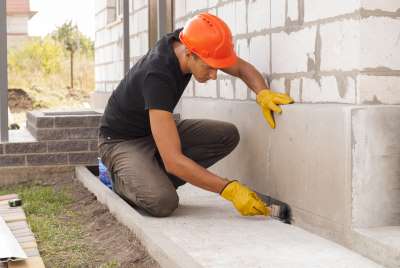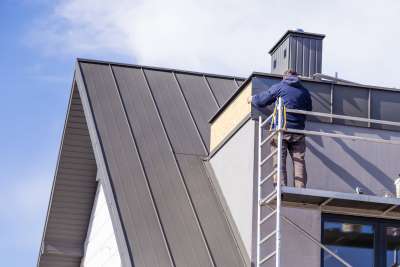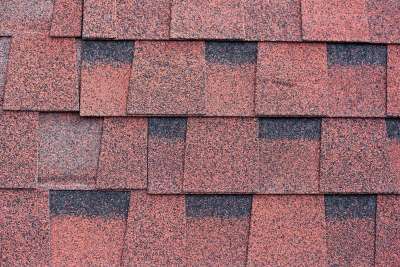Basement Waterproofing near Victoria, BC
Are you searching for a reliable and expert basement waterproofing company near me in Victoria BC?
Do you need someone to help with damage repair caused by flooding, or with leaking cracks in a crawl space or basement?
Currently your basement may not be flooded with unwanted water issues. This, however, does not mean that it is waterproof. There can be a false sense of security as water could be collecting in places we can’t easily see.
The result can be serious, including the weakening of the foundation your home sits on. The longer the length of time that these problems persist, the chances of them becoming more consequential can be dramatically increased.
In fact, if these issues are left untreated, they can seriously compromise the structural integrity of a building. Don’t underestimate the power of water. It is incredibly efficient at slowly and silently seeping into any area where it can.
Lack of proper waterproofing, mixed with the threat of small openings and cracks, leaks become a major issues. We've had times when the issue begins with a compromised roof, that allows water to seep between the interior and exterior walls, ending up in the basement.
If the time ever comes that you notice water starting to seep through your basement walls or floors, cracks, and even bowing, don’t put off what needs to be addressed asap, as it can quickly develop into a very serious flood in your home.
At Victoria Waterproofing, we are able to offer an array of repair products and techniques. Each are specifically designed as solutions for different source of leaks that can be found within foundation walls and concrete floors in a sublevel or basement.
We've been providing solutions for wet basements in neighborhoods around Victoria for some time now. So far there is no wet basement we can’t repair. That’s because our certified technicians are carefully selected and have the expertise required to get the job done quickly, effectively, and with long lasting results. There's no job too large or too small.
And we can help fix your home too. Give us a call and we’ll send one of our basement experts to come by and give you a free waterproofing estimate. Our goal is to help you make your basement dry all the time!
Repairing Leaking Cracks
Water is like magic. It can seem to appear out of nowhere. It can enter a home at any point where there is an opening in the foundation, including and not limited to only cracks in the walls and floors, but the seals and gaps around pipes coming into the home as well.
Our services include:
- Sealing Wall Cracks & Pipe Penetrations
- Fixing Leaky Floor Cracks
- Stop Flooding Through Windows
- Structural Repair
- Basement Crack Repair.
- Stairwell and Window Well Solutions
- Drainage Solutions
- Sump Pumps
We'd be honored to be your waterproofing specialists.
Let’s talk!
250-999-3509
Types of Waterproofing Materials
There are several types of waterproof building materials. For several reasons, using the right type of material for your buildings' specific requirements is very important. Not all waterproofing materials are appropriate.
A guide to different types of materials used in waterproofing is given below:
Polyurethane Waterproofing
Polyurethane liquid membrane is the most popular material for many purposes. For example, pedestrian decks, water tanks, ponds, balconies, roofs, bridges, parking decks, and so much more can be added with waterproofing. For many uses, it is a very flexible material that can be used.
The main aim of any form of waterproofing is to protect erected or ready-made structures from moisture and water penetration for different purposes. Waterproofing increases the reliability of construction projects which helps to save money on the restoration or repair of commercial, industrial and residential buildings.
Features and Benefits:
Especially used for decks, water tanks, ponds, balconies, roofs, bridges and parking decks
- Seamless coating of small areas on a large surface or spot embedding
- Easy to apply to every surface
- penetrating the surface very deeply
- Optimum elasticity level
- Just 2 mm necessary thickness of the application layer
- Minimum preparation time for service after the application
- Material's weight is minimal after curing, so we can use it on lightweight structures
- High UV resistance
- Self-application possibility
- Long lifetime of service (25-50 years)
Cementitious Coating Waterproofing
A powder composed of sand, organic and inorganic chemicals, and silica-based substances is a cement coating. It induces a hydration reaction when the active ingredients are mixed with lime, forming a waterproof seal. Since it is so simple to use many experts prefer working with this form of a coating. Using cement is one of the most common ways to waterproof residential solutions. This is usually the best choice for areas around toilets and showers that contain a lot of moisture.
Features and Benefits:
Used to treat water-retaining structures, concrete tunnels, and tanks, as well as water treatment facilities.
- Especially use for foundations, walls, sidewalks, and walkways
- Silica-based cement coating
- Extremely easy to apply
- Appropriate for industrial use
- Useful for underground structures, roofs and decks
- A broad range of concrete applications
- Professional usage
- Best choice for toilets and showers
- Available in spray and liquid forms
EPDM Rubber Waterproofing
For waterproofing your roof, EPDM Rubber is a very effective material. It is a synthetic rubber substance that can be used in a number of circumstances. It is a robust class M that is generated using ethylene and propylene. Although silicone is generally associated with it the two materials are extremely distinct. To provide a waterproof coating for roofs, EPDM rubber is mainly used. To this end, it works well. It is used in cars as well. The rubber is used for sealing windows, trunks and even forests in this sort of climate.
Features and Benefits:
- Using for industrial flat roof repairs and construction
- Using for door, window, and trunk seals
- Ideal material for outdoor applications
- Appropriate material for lighting
- Low electrical consumed
- Steam and water-resistant
- Automotive and HVAC
- UV, ozone, ageing, weathering, and much chemical exposure
- Great for outdoor application
Rubberized Asphalt Waterproofing
Rubberized asphalt is another waterproofing material. Fluid-applied membranes that consist of a mixture of asphalt and modified rubber polymers containing mineral stabilizers are hot rubberized waterproofing systems. It is extremely essential to maintain the temperature of the liquid in the kettle within the ranges defined. The acceptable range for most manufacturers is between 350 to 400 degrees Fahrenheit.
You'll want to go with this content if you're dealing with comprehensive vegetative assemblies or intense roofing assemblies. It can avoid problems and have the best results for you. This material is often used to provide RVs and campers with a waterproofing cover. On rubberized asphalt, there's a lot to like. It is really difficult, for starters.
Features and Benefits:
- Widely used for bridges, plazas, parking spaces, and commercial roofs
- Application Seamless offers monolithic waterproofing.
- Bridges up to 1/16 in width.
- Conforms to defects in surfaces.
- Absolute adhesion to the deck restricts the flow of lateral water.
- 100% of solids have an instant cooling remedy
- Very flexible and the permeability
- A popular material for its guarantee
- Mostly used is podium decks, parking decks, balcony decks, vertical foundation walls, roofs, vegetative roofs and so on.
Bituminous Membrane Waterproofing
A bituminous membrane is a thin layer of completely surface-bonded bitumen is a sticky, black, and highly viscous liquid or semi-solid type of petroleum, also known as asphalt. It is used extensively in a building. For the waterproofing of roofs, basements, under-ground structures, bridges and other structures, bituminous membranes are ideal. Bitumen technologies dominate roughly 60% of the flat roof market worldwide. These systems are often used in the form of roofing felt or roll roofing items, to build roofs.
Features and Benefits:
- Used in the terraces and balconies under tiles, flat roofs, basements and underground, parking decks and retainer walls
- Multiple-use for basement, podiums, below grade structures, bridge decks and tank linking
- 70% of bitumen is using for a road construction
- Roofing felt and the sealing of flat roofs
- Fully-bonded mechanism
- Immune to the most severe conditions of weather
- Maintenance simplicity
- Outstanding mechanical properties
- High strength against mechanical damage and punctures
Thermoplastic Waterproofing
Thermoplastic is another very common waterproofing material. This commodity may not be the cheapest out there but it provides a number of advantages. It is one of the best materials on the market for waterproofing.
This makes it more robust than many alternatives. The material can turn from solid to semi-solid when heated correctly. This helps a specialist to seal together the sheets or panels. In exchange, this allows thermoplastic waterproofing for the intended purpose more efficiently.
Features and Benefits:
- Mostly used for foundation walls, tunnels, under the slab, plaza decks, plaza deck restoration, green roofs and property line zero lot construction
- Sometimes the ingredient is also used for pharmaceutical products
- Widely used in split slabs, property lines, elevator pits, tanks, fountains, and decks
- Lifetime is more than 75 years
- Liquid-applied membranes
- Using fabrics and apparel here
- Durable and flexible
- Able to keep out air and liquid
Bituminous Coating Waterproofing
The bituminous coating process is also known as asphalt coating and is suitable for concrete foundations as it is an outstanding waterproofing and protective coating agent. The coating is made from bitumen-based materials that are not suitable for exposure to sunlight. If it is not treated with flexible materials such as polyurethane, extensive sunlight exposure renders it brittle.
Features and Benefits:
- Used for the building roof, basement and any surface, concrete roof and deck, old or new asphalt, small and large terrace.
- Not harmful and non-toxic to the human body
- Polyester, glass fabric and glass fiber materials
- Easy to perform
- Able to cover complex surfaces
- Heating is not required
- Can be applied independently
- The thickness of the bitumen is 2mm
PVC Waterproofing Membrane
PVC (polyvinyl chloride) roofing is a single-ply roofing membrane that has been used for more than 50 years on flat roofs, in addition to low-sloping roofs. Two layers consist of a PVC roof. To act as reinforcement, polyester is added between the layers. Those layers have additives that offer durability and other advantages to the roofing material.
The waterproofing volume content of polyvinyl chloride (PVC) is one excellent high-quality performance material, mixing manufacturing assistants and high-volume material of polymer waterproofing. In any sundeck or waterproofing project, the PVC membrane adds elegance and value, providing protection against rot and costly maintenance or repair costs.
Features and Benefits:
- Used for walkable surfaces including sundecks, patios, balconies, pool surrounds, stairs, porches, balconies, sundecks and roof decks.
- Designed for heavy foot traffic and the harshest weather conditions in Canada
- Used to waterproof underwater buildings, tunnels and swimming pools.
- It is mainly used for roofs that are waterproof
- Ideal for substrates made from wood
- Applied to almost any surface, even over concrete
- It is possible to install in any weather
- Flexible and strengthened membranes
- It is not going to peel, crack or delaminate
- No water, snow or ice on the surface of the membrane prevents the vapor flow to the atmosphere.
- No dirt is accumulated on the surface of the membrane to hinder vapor transmission.
- Lifetime for roofing exceeds for 30 years and underground surpasses for 50 year
Liquid Waterproofing Membrane Method
Liquid Waterproofing is the most appropriate material for water insulation. A thin layer, typically consisting of a primer coat and two coats of topcoat applied by spray, roller or trowel, is the liquid waterproofing membrane process. It provides more flexibility than waterproofing styles based on cement. It is therefore used more intensely today. The durability of the waterproofing coating depends on what kind of polymer is used by the manufacturer in liquid waterproofing construction. A spray-applied liquid membrane consisting of polymer modified asphalt can be the liquid waterproofing membrane.
Features and Benefits:
- Very much easy to apply
- Liquid membrane is seamless
- It’s very much flexible and durable
- Adaptable power is strong
- Versatile in nature
- High performing volume
- Appropriate for green roofs, buried roofs and inverted roofs and terraces
Mastic Asphalt Waterproofing
A mixture of bitumen, filler, sand and chippings is Mastic asphalt. It is possible to use this building material, which has been tried and tested for centuries and is new at the same time, in several different ways. It can be adapted by targeted modification of the composition of the mixture to the most diverse requirements. When life cycle cost analysis is conducted, Mastic asphalt still wins.
Features and Benefits:
- Mastic asphalts thickness is 35 mm
- Ecological and 100% reusable commodity
- Fire-resistant and Highly durable
- Resistant to chemicals, root-resistant and resistant to salt de-icing.
- Mastic asphalt screeds in building structures
- Simple to retain
- only water is needed for cleaning
- Durability and low maintenance cost
- Eco-friendly
Therefore, any need for waterproofing or water resistance technology can be applied to solve any particular problem or situation. Therefore, as we plan any other aspect of construction or renovation, it is important to plan the waterproofing process. There are plenty of special types of waterproofing materials at the end of the day. Some are more popular than others. So, you have to know about your expectations
.
As stated a few times on this page, all waterproofing building materials are not equal. It's important to to take some time and energy to figure out which one fits better for the needs of your individual project. To find out which one is going to be most appropriate for your precise application, we will collect data and make assessments and suggestions based on a number of factors
.
Our skilled team members will provide you with a free quote and various options to suit your requirements and budget. We’ll make the process simple and easy.







